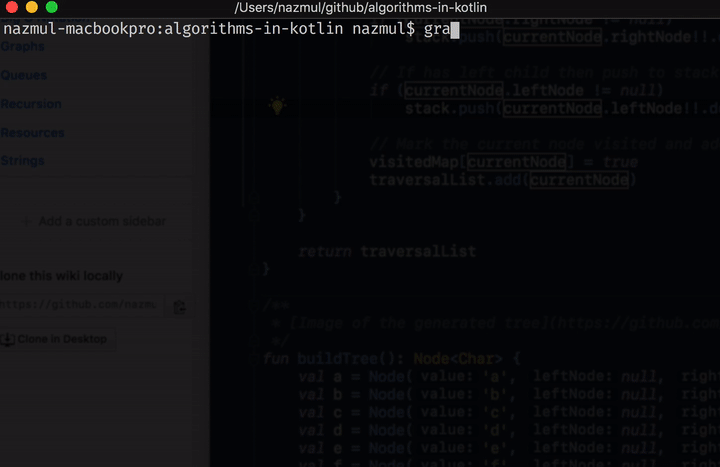Algorithms in Kotlin, Caches, Part 7/7
Introduction #
This tutorial is part of a collection tutorials on basic data structures and algorithms that are created using Kotlin. This project is useful if you are trying to get more fluency in Kotlin or need a refresher to do interview prep for software engineering roles.
How to run this project #
You can get the code for this and all the other tutorials in this collection from this github repo. Here’s a screen capture of project in this repo in action.

Once you’ve cloned the repo, type ./gradlew run in order to build and run this project from the
command line.
Importing this project into JetBrains IntelliJ IDEA #
- This project was created using JetBrains Idea as a Gradle and Kotlin project (more info). - When you import this project into Idea as a Gradle project, make sure not to check “Offline work” (which if checked, won’t allow the gradle dependencies to be downloaded). - As of Jun 24 2018, Java 10 doesn’t work w/ this gradle distribution (v4.4.x), so you can use Java 9 or 8, or upgrade to a newer version of gradle (4.8+).
LRU and MRU #
enum class Type { LRU, MRU }
class Cache<T>(val type: Type, val size: Int) {
val map = mutableMapOf<T, Int>()
var rank = 0
fun put(value: T): T? {
var evictedKey: T? = null
when {
map.containsKey(value) -> {
// Increase rank of existing value.
map[value] = rank++
}
map.size == size -> {
// Remove the lowest or highest rank item in the map depending on Type.
evictedKey = findKeyToEvict()
map.remove(evictedKey)
map.put(value, rank++)
}
else -> {
// Add the new item.
map.put(value, rank++)
}
}
return evictedKey
}
/**
* LRU means evict the item in the map w/ the lowest rank.
* MRU means evict the item in the map w/ the highest rank.
*/
fun findKeyToEvict(): T? {
val rankToEvict = when (type) {
Type.MRU -> Collections.max(map.values)
Type.LRU -> Collections.min(map.values)
}
val keyToEvict = map.entries.find { it.value == rankToEvict }?.key
return keyToEvict
}
override fun toString(): String = StringBuilder().apply {
val list = mutableListOf<String>().apply {
for (entry in map)
add("'${entry.key}'->rank=${entry.value}".yellow())
}
append(list.joinToString(", ", "{", "}"))
}.toString()
}
Notes on implementation #
- According to the LRU Algorithm, the lowest rank item will be removed when a new one is inserted and there’s no space left in the cache. Also, every time an item is inserted into the cache it’s rank is set to the highest rank.
- According to the MRU Algorithm, the highest rank item will be removed when a new one is inserted and there’s no space left in the cache. Also, every time an item is inserted into the cache it’s rank is set to the highest rank.
LRU cache w/ O(1) cost of cache eviction #
In the above implementations of LRU and MRU caches, there’s a cost to finding the key that needs to be evicted when the capacity has been reached. The following implementation provides a way to do this w/out incurring such a cost.
/**
* This is a LRU cache that has no performance impact for cache insertions
* once the capacity of the cache has been reached. For cache hit,
* performance is O(1) and for cache eviction, it is O(1).
*/
class LowCostLRUCache<K, V>(private val capacity: Int = 5) {
private val cache = HashMap<K, V>()
private val insertionOrder = LinkedList<K>()
/**
* [HashMap] put and remove is O(1).
* More info: https://stackoverflow.com/a/4578039/2085356
*/
fun put(key: K, value: V): K? {
var evictedKey: K? = null
if (cache.size >= capacity) {
evictedKey = getKeyToEvict()
cache.remove(evictedKey)
}
cache[key] = value
insertionOrder.addLast(key)
return evictedKey
}
/**
* [HashMap] get is O(1).
* More info: https://stackoverflow.com/a/4578039/2085356
*/
fun get(key: K): V? = cache[key]
/**
* The head of the [insertionOrder] is removed, which is O(1), since this
* is a linked list, and it's inexpensive to remove an item from head.
* More info: https://stackoverflow.com/a/42849573/2085356
*/
private fun getKeyToEvict(): K? = insertionOrder.removeFirst()
override fun toString() = cache.toString()
}
References #
You can get more information on Cache replacement policies on wikipedia.
Resources #
CS Fundamentals #
- Brilliant.org CS Foundations
- Radix sort
- Hash tables
- Hash functions
- Counting sort
- Radix and Counting sort MIT
Data Structures #
Math #
- Khan Academy Recursive functions
- Logarithmic calculator
- Logarithm wikipedia
- Fibonacci number algorithm optimizations
- Modulo function
Big-O Notation #
- Asymptotic complexity / Big O Notation
- Big O notation overview
- Big O cheat sheet for data structures and algorithms
Kotlin #
- Using JetBrains Idea to create Kotlin and gradle projects, such as this one
- How to run Kotlin class in Gradle task
- Kotlin
untilvs.. - CharArray and String
Markdown utilities #
👀 Watch Rust 🦀 live coding videos on our YouTube Channel.
📦 Install our useful Rust command line apps usingcargo install r3bl-cmdr(they are from the r3bl-open-core project):
- 🐱
giti: run interactive git commands with confidence in your terminal- 🦜
edi: edit Markdown with style in your terminalgiti in action
edi in action
